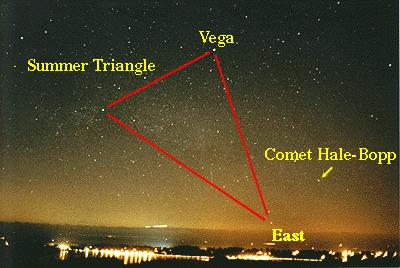Credit & Copyright: D. Moffatt
(DOA),
ScienceWeb,
Starry Messenger Communications
Explanation:
Vega is a bright blue star 25 light years away. Vega is the brightest star in the Summer Triangle, a group of stars easily visible
summer evenings in the northern hemisphere. The name
Vega derives from Arabic origins, and means "stone eagle."
4,000 years ago, however, Vega was known by some as "Ma'at" -
one example of ancient human astronomical knowledge and language.
14,000 years ago,
Vega, not Polaris, was the
north star. Vega is the fifth brightest star in the night sky, and has a diameter
almost three times that of our Sun.
Life
bearing planets, rich in liquid water,
could possibly exist around Vega. The
above picture,
taken in January 1997, finds Vega, the
Summer Triangle, and
Comet Hale-Bopp high above
Victoria,
British Columbia, Canada.
Tomorrow's picture: An Annular Eclipse of the Sun
1999 2000 2001 2002 2003 2004 2005 2006 2007 2008 2009 2010 2011 2012 2013 2014 2015 2016 2017 2018 2019 2020 2021 2022 2023 2024 2025 2026 |
Январь Февраль Март Апрель Май Июнь Июль Август Сентябрь Октябрь Ноябрь Декабрь |
NASA Web Site Statements, Warnings, and Disclaimers
NASA Official: Jay Norris. Specific rights apply.
A service of: LHEA at NASA / GSFC
& Michigan Tech. U.
|
Публикации с ключевыми словами:
Summer Triangle - Вега - яркость - Планеты у других звезд
Публикации со словами: Summer Triangle - Вега - яркость - Планеты у других звезд | |
См. также:
Все публикации на ту же тему >> | |
